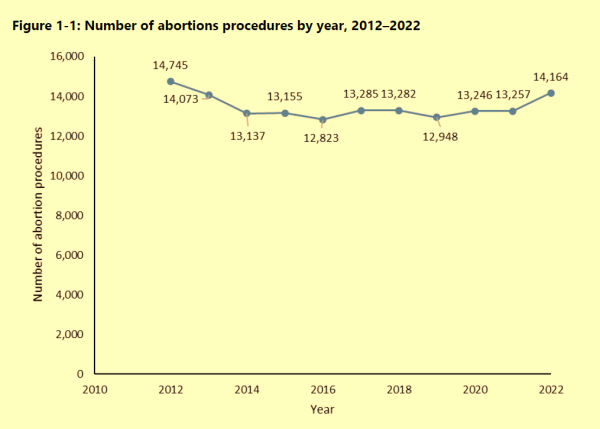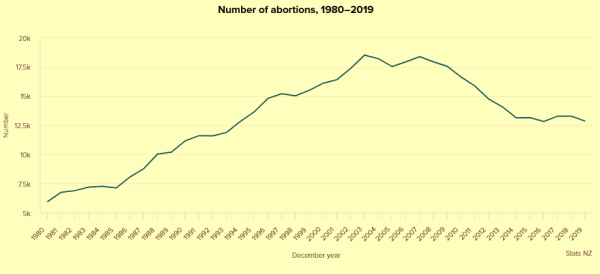NZ Catholic bishops urge Government to reduce stress on young families to counter rising abortion numbers

New Zealand’s Catholic bishops say the rise in abortion numbers since a 2020 law change is a tragedy and they want the new coalition Government to promote policies that reduce stresses that can lead to mothers opting for abortion.
The number of abortions peaked at 18,511 in 2003 (see table at bottom) before falling steadily to 12,823 in 2016, when an initially slow rise began, up 434 over five years to 13,257 in 2021. Then followed a big one-year jump of 907 or 7 per cent to 14,164 in 2022 (see table above). Additionally, the number of abortions for each 1000 known pregnancies has risen to 193 from a low of 177 in 2016.
Bishop of Auckland Stephen Lowe, who is President of the NZ Catholic Bishops Conference, says the bishops will continue to advocate for the legal right to life of all unborn children who have no voice themselves.
“We know that we are living in a time of increased financial constraints and that this only adds to the stress on families,” says Bishop Lowe. “We urge the new Government to keep the well-being of young parents and families to the fore in their policies, and we urge all Catholics to ensure that our faith communities are places of non-judgemental, welcoming and generous love, compassion and care.”
Abortion became simpler to get after members of Parliament passed the Abortion Legislation Act in 2020.
In her foreword to the 2023 annual report Abortion Services Aotearoa New Zealand, Director-General of Health Dr Diana Sarfati links the 2022 increase to the doubling of the “abortion workforce,” more facilities providing abortion services, increased accessibility through midwifery abortion services and new phone and online services for “early medical abortion,” in which women can collect an abortion pill from a pharmacy to take at home.
“The annual report applauds the fact that the increased numbers reflect improved accessibility and equity of access to abortion throughout New Zealand,” says Bishop Lowe. “However, those who work at the coal face providing pregnancy support services know that for many women, the decision will have been the result of a choice made under significant duress or constraints, including financial constraints. This represents a tragedy on multiple fronts because every pregnancy involves the lives of at least two adults as well as the newly conceived child.”
In October, the Catholic bishops republished an expanded, landmark teaching document Te Kahu o te Ora: A Consistent Ethic of Life, a copy of which they sent last week to all 123 members of the new Parliament. In it, they say “the unborn child is clearly one of the most vulnerable, innocent and defenceless of all human beings. This imposes a significant moral obligation on us all.”
Bishop Lowe says every new human life is a gift from God and has an unconditional dignity that gives them an absolute right to life.
“As highlighted in Te Kahu o te Ora, we all need to back up our teaching on life with action. We need to remember that our obligations and responsibilities extend to creating an environment within families and society where pregnant mothers and their partners are supported and children are made welcome. In cases where continuing a pregnancy poses challenges for those most directly involved, it is vitally important that people do not see abortion as the only or most desirable possibility.
“We will continue to advocate for the legal right to life of all unborn children who have no voice themselves. It is up to all of us to lobby to make our country a safer place for every unborn child, and that must flow through to the care and support we offer to families after birth,” says Bishop Lowe.
“Abortion is abusive, causing long term harm to the mother, which is almost never addressed. It also causes damage to the father of the child, something also often not addressed, and, of course, it ends the life of a human being.”
- Link to Te Kahu o te Ora: A Consistent Ethic of Life
- Link to Abortion Services Aotearoa New Zealand 2023 Annual Report
Note to the two tables: Below are the Statistics NZ Abortion statistics 1980 to 2019, showing 2003 as the peak year for abortions. At top are the Ministry of Health Abortion Services Aotearoa New Zealand abortion statistics from 2012 to 2022. The latter replaced Statistics NZ as the compiler of abortion statistics with the passage of the Abortion Legislation Act in 2020.
